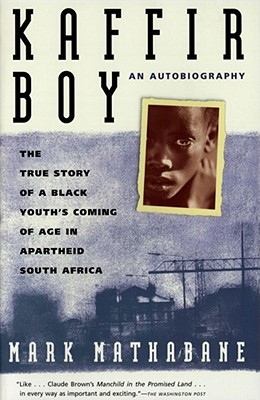One of the trends that I noticed in the type of books that are scrutinized by would-be censors is that many of them are set in cultures other than our own in America. The reasons given for wanting to remove these titles from libraries and reading lists don't dare to mention that, but it does seem to be a contributing factor whether said or unsaid.
Let's look at a few of these questioned books that happen to take place in other countries and wonder why they in particular were selected for such anxious attention:
KAFFIR BOY: Mark Mathabane's 1986 autobiographical account of his childhood in apartheid ruled South Africa is an award winning book that is highly recommended by the American Library Association as one of the outstanding titles to be read by " the College-Bound and Life-Long Learners."
Yet, it has been challenged in many classrooms over the years, as recently as 2007 and 2010 for a section of the book that deals with child prostitution. Many have called for a revised version to be taught in schools, something the author himself was not in favor of yet reluctantly gave permission for in one instance in order to allow students to read and discuss it.
Many teachers still use the original text, much to their credit, and it's sort of amazing than in an entire book about living under an oppressive racist regime, it's only the one page that mentions a sad yet real plight of many children in this world that makes people want to shield the eyes of students from it:
THE HOUSE OF THE SPIRITS: Since it's debut in 1982 as a Spanish language title(which was published in English in 1985), Isabel Allende's novel about the rise and fall of a well to do family in Chile has earned international acclaim and is considered a modern classic of Latin American literature.
Yet many still raise objections to having students read it, complaining of "sexual themes" and that it didn't teach any "life lessons". In a 2013 battle over THOTS in South Carolina, a county commissioner was quoted as saying about the book: “It’s filth…. Honestly, what normal family is like this book? The Manson family, maybe, Ted Bundy? I think this is just so wrong.”
Isabel Allende herself wrote an impassioned letter to that particular Board of Education to advocate for interested students to have access to The House of The Spirits, even as optional reading. The outcome of that was a reinstatement of the book after a third and final appeal yet the fight is probably far from over to allow students the chance to appreciate the work of women authors in translation like Allende, who is one of the best known out there:
BLESS ME,ULTIMA: This coming of age story by Rudolfo Anaya has been growing in readership and praise since it was first published in 1972. Set in New Mexico during the 1940s, it is the first book in a trilogy that explores the struggles of the Chicano community and is considered a hallmark in Chicano American literature.
The battles to remove it from classrooms include the usual suspects of censorship concern such as "adult language" and mature content but also, the book has been accused of being anti-religious(anti-Catholic be exact) and to even be endorsing satanism!
That charge is based on the grandmother mentioned in the title who practices traditional folk healing medicine and who is willing to sacrifice herself for the good of her grandson, which sounds mighty Christian to me. It's a shame that a book of such obvious merit winds up being on the banned books list over and over again, due to some of the small minded fears that some of it's characters are made to deal with:
THE KITE RUNNER: I plan to read this one during Banned Books Week as it's far past time that I do. Khaled Hosseini's debut novel that showcases a childhood friendship in war torn Afghanistan that is vastly changed by the time both boys are adults has been a well received bestseller for over ten years.
The book has been challenged since 2008 by folks who claim that it's "inappropriate to the age group" due to language, content and a predatory sexual assault against a youth. It's also been sited for "homosexuality" and "religious viewpoints", the latter sounding a lot like religious intolerance as a move to ban the book from an Arkansas school included the notion that the "students’ belief that America is one country under God would be undermined by reading the novel."
From what I do know of the story, one of the central themes involves trying to earn redemption for failing to help a friend in need, a dilemma that is rather universal to say the least. One of the best ways to learn that other people are no different from you and me is by reading stories from cultures other than our own, something that I hope has helped me to become more understanding of the wider world. If we can't try to relate to a story about friendship, what does that say about us?:
I prefer fiction as it can be an even playing field for ideas (although not always) but think about this during Banned Books Week; how can we move forward as a people if we're too afraid to even read about people other than ourselves?
It's not only important for young people to read diversely, it's good for those of us on the older side to expand our literary horizons as well. A good story is a good story, for any race, religion or age as those checking out the much challenged YA novel The Absolutely True Diary of a Part Time Indian can attest to. The power of banning is no match for the power of reading:



No comments:
Post a Comment